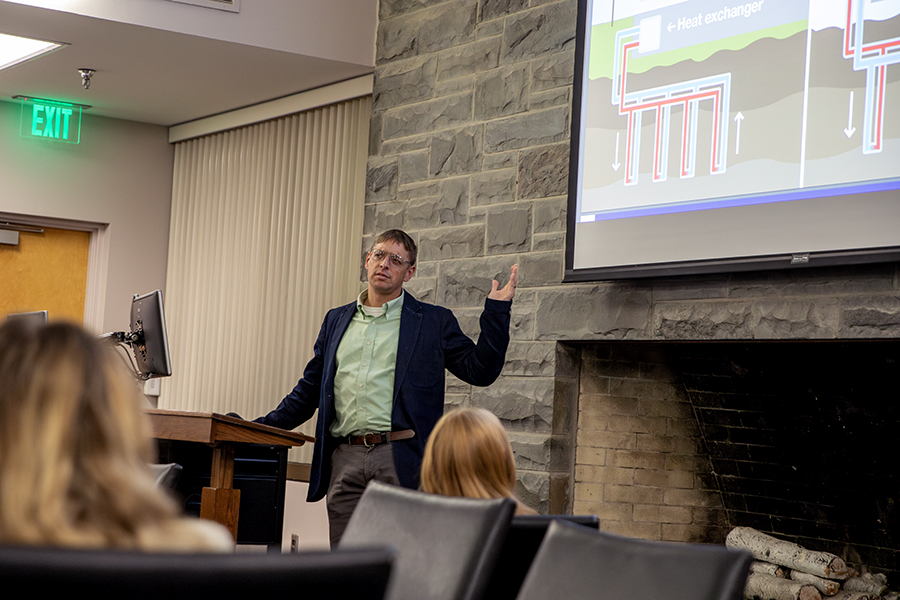Scott Doyle, director of the Office of Energy Management and Sustainability, met with the Student Governance Council on Oct. 23 to discuss actions for sustainability at Ithaca College. The SGC also heard from Iurii Kovalenko, the field service representative for Apogee.
Doyle said there are three main scopes of climate action; natural gasses and transportation, which the college is currently working on, and electricity on campus, which the college has addressed. The stationary sources on campus, including natural gasses for heat, hot water and college vehicles; refrigerant used for cooling systems on campus; and fertilizer for the gardens and grasses on campus, are a main focus. Doyle said the Town of Ithaca developed an energy code supplement, which requires organizations to think about several different factors of energy impacts before construction. Doyle said the college can use this system when looking at big systems in some of the buildings and how they can become more sustainable systems.
“We’re looking at some larger programs that help us think about, not only what we want to improve in campus operations, how it works for all of you and learning and living here, but doing it in a way that’s going to be more meaningful for a long–term climate impacts,” Doyle said.
The second scope Doyle highlighted is the power and electricity the college buys from outside groups like the City of Ithaca. The college only owns two buildings in the City of Ithaca, the boathouse and a small warehouse building on the way down toward Coddington Rd. In the next couple of months, the City of Ithaca is implementing a program called Community Choice Aggregation (CCA), which defaults all buildings to get power from renewable resources unless the owner of the building opts out. The second scope has mostly disappeared as of 2019 because the college started using fully green energy, like wind, from out-of-state or out-of-county sources.
The third scope Doyle mentioned is other items, specifically commuting and transportation of faculty, staff and students. Doyle said there are a couple of electric vehicle charging stations around campus, however, the college needs to expand that number. Doyle said there are currently four public chargers in the visitors’ parking lot and at the Circles Apartments Community Center. In September, the chargers were used 142 times by 54 unique users with an average charge of three hours and 45 minutes. Doyle also said the college is looking into electrifying the college’s fleet of vehicles.
Commuting across campus, Doyle said he has been very pleased with the number of students riding the TCAT and using Ithaca BikeShare.
“The September numbers saw, on average, 24 bikes on campus and over 1,100 trips from campus,” Doyle said. “This is really an impressive thing and it’s proving to me that this is something that’s worth having us invest in as a college and thinking through how can we have this resource provided we build in a safe and reliable way.”
Sophomore Rishabh Sen, vice president of student affairs, asked what the next steps are in order to move away from big natural gas systems in the college’s buildings.
“The problem is we have these big systems that are reliable and they are actually pretty cost-effective with natural gas,” Doyle said. “That’s tough to make that leap to transition over.”
Kovalenko discussed changes to the Apogee system made over the summer. Kovalenko said he wanted to answer any questions from SGC about difficulties connecting to wifi and make students aware of Apogee’s systems.
Kovalenko reminded SGC that Apogee provides services only for residential buildings and students will not have access to Apogee’s internet unless in their residential halls. Kovalenko said one of the main changes made was the auto-detection of a device’s MAC address. This allows students to log in to ResNet without having to scour for their device’s MAC address. Kovalenko said students still need to log in to their Ithaca College account so Apogee can connect fully.
Kovalenko said that because the layout varies in each room, the location of access points has become a slight hazard. Kovalenko said many access points have broken already. With one main access point between three or four rooms, if one gets disrupted or broken, neighboring rooms will be affected.
“This is causing the stopping of services and poor connectivity because the AP goes offline,” Kocalenko said.
Kovalenko said to physically fix the broken access points, students need to reach out to Information Technology services on campus.
Following the guest speakers, senior student trustee Alexa Rahman discussed events during the Fall 2023 Board of Trustees meeting from Oct. 18–20. Rahman said the trustees voted on a tuition room and board cap for the 2024–25 academic year. Rahman said the trustees also heard updates about a need to increase enrollment, building and grounds projects, and a review of Title IX.
“In February, we’ll have another meeting in LA because that’s where the alumni base is mostly because we have our campus out there,” Rahman said. “At that meeting, we’re gonna learn a lot more about enrollment, and as you know we are searching for a VP right now, so hopefully we’ll get somewhere with that by the end so we can try to increase enrollment here.”
During officer reports, both Carli McConnell, president of the student body, and Sen mentioned the campus climate survey, which went live on Oct. 17 and is available until Nov. 14. The campus climate survey can be found on Intercom. Both said the survey is a great way for students to share their voices and thoughts with the school.
“It was conducted a couple years ago and it gave really good insight into what campus is like for minority groups,” Sen said. “The Center of Equity, Inclusion, and Belonging is forming their plan for the coming years [around the survey]. So it is very important that we get as much information from it this year as possible.”
The SGC is the sole representative body for the Ithaca College student community. The SGC can be contacted at [email protected].









